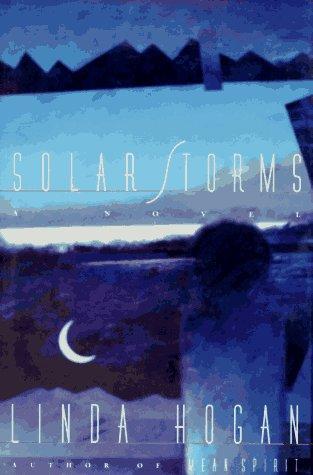A story both soulful and righteous, Solar Storms is the tale of clashing cultures; industrial and
indigenous, sustainable and insatiable.
Author Linda Hogan, a Chickasaw poet, begins the novel with
Angel Wing, a young indigenous woman living in the city, long-ago disconnected
with her family and people. Angel was abused and neglected as a baby by her
mother and has grown up with the inevitable effects, including a tendency towards self-destruction.
 This all changed, though, when Angel rejoined with her
Grandmothers in a territory still held by the Native people called Adam’s Rib,
a land of mostly women. There, Angel began to realize her true self—her
humanity—and learned again an ancient way of relating to the land that had, until that
point, been waiting inside of her to come forth.
This all changed, though, when Angel rejoined with her
Grandmothers in a territory still held by the Native people called Adam’s Rib,
a land of mostly women. There, Angel began to realize her true self—her
humanity—and learned again an ancient way of relating to the land that had, until that
point, been waiting inside of her to come forth.
Tragically, the inhabitants of Adam's Rib begin noticing that the fish are
suffering, and the river along with them. They get word that the cause is
construction of dams by Whites encroaching in a territory more North. This spurs Angel and her Grandmothers to travel by canoe on more than a
week-long journey in hopes of finding a way to assist their fellow tribal
communities in resisting the destruction of the land.
Upon arrival, it’s clear they have found the place of
conflict and resistance. Native people had been organizing community meetings
to discuss how to resist the dam-building, which would divert the river. Some
construction of roads had already begun, evident by the dying natural
communities who had once flourished in its fatal path.
Tulik, a man well known for having
affinity and wisdom about medicinal plants, summed up his people’s attitude in a verbal response to outside corporations offering to bring in electricity: “What could be better
than what we now have? We have food. We have animals. We grow our own garden.
We have everything. For us, this is better than what you offer.” Dora-Rouge, the eldest Grandmother of Angel,
commented further: “We were happy before you came here. We treated the land
well. We treated animals well. Our children wanted to live.”
Many activists and warriors descended on this area to
help fight back. A plan of action was decided: The train tracks were to be blockaded. The action saw success and lasted for many days, predictably leading to the harassment
of prominent activists, and eventually an armed stand-off between corporate forces—including their military arm, called the Police—and protesters.
Throughout this conflict, Angel had many important
reflections on resistance and the traditional ways of her people which I think
brilliantly sum up the urgent struggles that indigenous communities and the
natural world are currently facing.
“For my people, the problem has always been this: that the
only possibility of survival has been resistance. Not to strike back has meant
certain loss and death. To strike back has also meant loss and death, only with
a fighting chance.”
Before civilization, she said, “we knew the languages of earth, water,
and trees. We knew the rich darkness of creation. For tens of thousands of
years we spoke with the animals and they spoke with us.”
“Those with the money, the investments, the city power, had
no understanding of the destruction their decisions and wants and desires brought
to the world. If they’d known what their decisions meant to our people, and if
they continues with this building in spite of knowing, then they were evil.
They were the cannibals who consumed human flesh, set fire to worlds the gods
had loved and asked the humans to care for.”
In the end, the dams were stopped. But, this victory was not
without struggle and loss; there were significant deaths of humans and
non-humans which could not be reversed.
The lessons we can learn from this story should be obvious.
The time to fight against dams, and other industrial projects, is not when the
fish are completely dead and the rivers are dried up. The time is now. There
are countless rivers in the world today struggling to survive in spite of
countless life-choking dams. If any of us could muster even a fraction of the
courage of the resisters in this book—or of traditional indigenous communities
resisting such projects in reality today—there might be a real chance for
defending what’s left of our landbases and seeing them flourish once again.
Reading this book made me feel more human and fulfilled the
sacred task of all pieces of art and literature by inspiring me to continue
fighting with all I have for the life of this beautiful planet.



